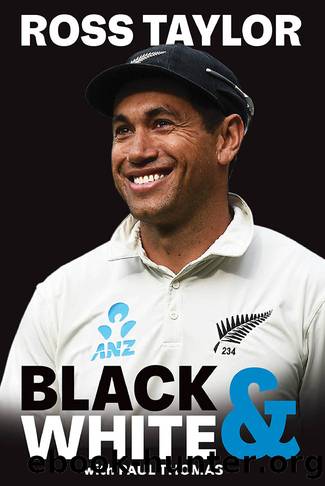Ross Taylor by Paul Thomas

Author:Paul Thomas
Language: eng
Format: epub
Publisher: Upstart Press
Chapter 10.
Mind Game
Talent is what you see from the outside: what this guy can do with the ball, what that guy can do with the bat. But there arenât many sports in which the mental component looms as large as it does in cricket, and itâs hard to tell from the outside where a player is at mentally. This batter mightnât be as talented as that batter, but he could be mentally stronger; he might have unshakeable self-belief and a ravenous appetite for runs.
As a kid, I was a big fan of Mark Waugh. Mark was a sublime talent, but his twin brother Steve had a significantly better test record, averaging 51 with 32 centuries compared to his brotherâs 41.8 with 20 centuries. (Mark had the better ODI record.) I donât believe for one minute that Mark was mentally weak; it just seemed to me that he didnât have Steveâs hunger. Steve made 150 or more against all the other test-playing nations; Mark reached 150 just once in 128 tests. Steve seemed to operate on the old principle that, when you get to 100, you should take fresh guard and start again. Whatâs more, he really liked being not out, which was something I strived to do. When Mark got to 100, it was almost as if heâd had enough.
Not that long ago, using a sport psychologist/mental skills coach was seen by the public and many players as a sign of weakness rather than a sensible response to the reality that cricket is very much a mental game. Perceptions are changing: itâs becoming standard in elite sport â the All Blacks have been using Gilbert Enoka for years â and more widely accepted as a legitimate and effective part of self-improvement. Sports psychologists have been a massive help to me and a big influence on my career. I started with Gary Hermansson, but also worked with Gilbert and Pete Sanford, the New Zealand Cricket (NZC) mental skills coach. Eventually, I came full circle back to Gary.
Youâre on the road, growing up in the public eye, dealing with failure, form fluctuations and media criticism. However hard you try to avoid seeing or hearing what the media are saying, it gets back to you one way or another. And, when that happens, you have to understand that your family and friends have good intentions. Furthermore, while they revel in your success, the media and public criticism hits them hard. As a professional sportsperson, you have the tools to deal with criticism and the opportunity to go out there and set the narrative. Family and friends donât have those tools or that opportunity.
Athletes face an array of challenges over the course of their careers â including teammates and coaches doing their heads in â and can become prone to jumping at shadows. A sports psychologist can help you get on top of an issue before it becomes a significant or even overwhelming distraction.
A lot of it is just an offload; as Mike Sandle often says, âA problem shared is a problem halved.
Download
This site does not store any files on its server. We only index and link to content provided by other sites. Please contact the content providers to delete copyright contents if any and email us, we'll remove relevant links or contents immediately.
Going Long by Editors of Runner's World(2362)
The Happy Runner by David Roche(2238)
Yoga For Dummies by Georg Feuerstein(1451)
Becoming Boston Strong by Amy Noelle Roe(1390)
Legacy by Kerr James(1294)
Winger by Smith Andrew(1260)
The Little Red Book of Running by Scott Douglas(1205)
Wodehouse At the Wicket by P.G. Wodehouse(1119)
Bowerman and the Men of Oregon by Kenny Moore(1118)
The Way of the Runner by Adharanand Finn(1103)
5050 by Dean Karnazes(1100)
Running Your First Marathon by Andrew Kastor(1074)
Swim, Bike, Run - Eat by Tom Holland(1051)
Blade Runner by Oscar Pistorius(1018)
The Coming Storm by Nigel McCrery(1009)
Spiked (Blocked Book 3) by Jennifer Lane(1000)
The Grade Cricketer by Dave Edwards(983)
The Amazing Test Match Crime by Adrian Alington(978)
The Shared Origins of Football, Rugby, and Soccer by Christopher Rowley(977)
